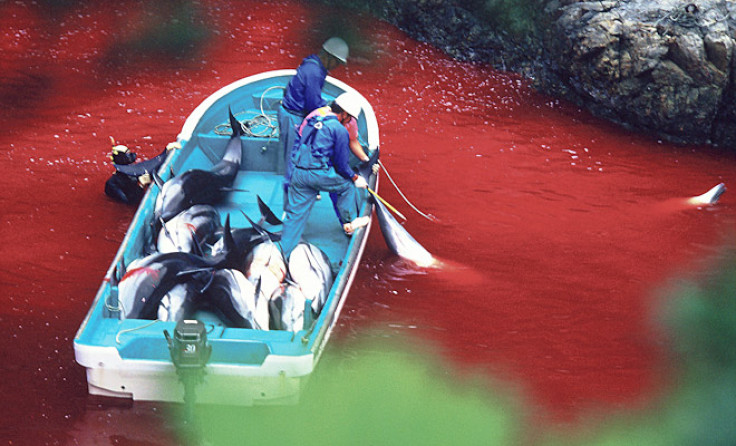Dolphin Slaughter: Fishermen Kill 30 More on Taiji Coast

Fishermen have killed up to 30 more dolphins in the Japanese coastal town of Taiji, according to campaigners.
As outrage over the slaughter spreads globally, activists from the environmentalist group Sea Shepherd claimed fishermen were encouraging the animals to swim into a covered area to hide the killings.
Melissa Sehgal, a spokesperson told the Agence France-Presse, that over two dozen dolphins had been hunted on Thursday morning. She said that the fishermen used large metal skewers to piece the dolphins' spinal cords.
According to Seghal, "It takes up to 20 to 30 minutes for these dolphins to die, where they bleed out, suffocate or drown in the process of being dragged to the butcher house."
She said: "They continue to use tarps to cover the slaughter, and physically drive the pod under the tarps... to avoid cameras.
"You can hear the dolphins splashing below. It was approximately 30 dolphins - striped dolphins - that were all slaughtered this morning."
She added: "Over 1,200 dolphins have been driven into the cove since September 1, when the season began. Of those 1,200, over 600 dolphins have been slaughtered, not including today, and 149 have been taken captive."
Off Japan's Pacific coast, fishing boats search for pods of dolphins before enticing them towards the shore by banging on metal poles beneath the water, that are attached to the vessels.
The animals swim away from the sonar wall and the fishermen can herd the mammals into nets in the bay. Some of the dolphins are sold to aquariums, while others are killed for their meat.
However, the meat is only consumed in a small number of rural towns in Japan - the government has recommended limits on eating the product because of the high levels of mercury.
Those who defend the killings have claimed it is a tradition, pointing out that dolphins are not endangered. They argue that Western objections fail to recognise the hypocrisy of complaining, while cows, pigs and sheep are killed for their meat.
There has been a global outcry against the slaughter, which protesters have said is inhumane. According to tradition, the hunt will end at the end of February.
On the issue, a Peta spokesperson said: "Dolphins are made of flesh, blood and bone, just as we are, and of course, they can feel terror and pain, just as we do. They're so devoted to one another that even those who escape from the killing area have been known to linger nearby to wait for their family, even if that means being killed themselves.
"The 2009 Oscar-winning documentary The Cove opened people's eyes to the annual massacre in Taiji in the same way that the recent Bafta-nominated film Blackfish has opened the world's eyes to the suffering of orcas and other dolphins in captivity, but the two documentaries are intrinsically linked because many dolphins from Taiji's "prize catch" are removed before slaughter and sold for use in captive-dolphin shows."
They added: "Those of us who are sickened by what is happening in Taiji right now can help put a stop to it by refusing to visit any marine mammal parks, which help fund the annual slaughter in this tiny town.
Many have turned to Twitter to condemn the practice:
“@Buzzy14: The Children of Hong Kong have now made a human pic for the dolphins, to protect them. pic.twitter.com/VOojsMjd4n”
— teresa m savage (@mimosavge) January 23, 2014BRAVE JAPANESE ACTIVISTS IN THE COVE FOR THE DOLPHINS!
WE SALUTE YOU! #HelpCoveDolphins #blackfish pic.twitter.com/CySNy2qxdS RT@OrcaSOS
— Irina Tikhomirova (@IrinaGreenVoice) January 21, 2014The Cove: Sign the Petition to Help Save Japan's Dolphins http://t.co/u8wWt9pH2m via @TakePart
— Sophia Butler-Cowdry (@SophiaH2o) January 23, 2014© Copyright IBTimes 2024. All rights reserved.






